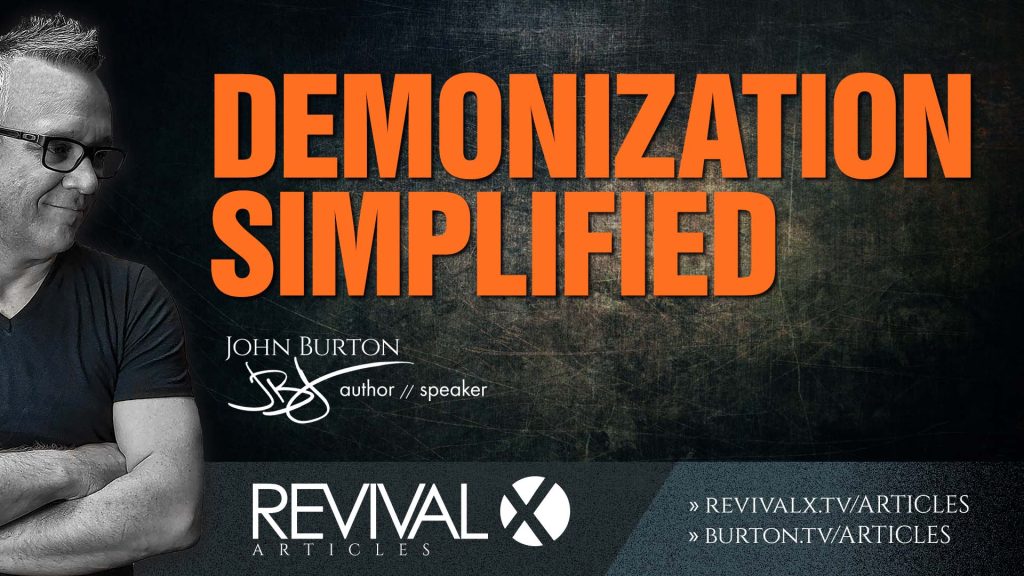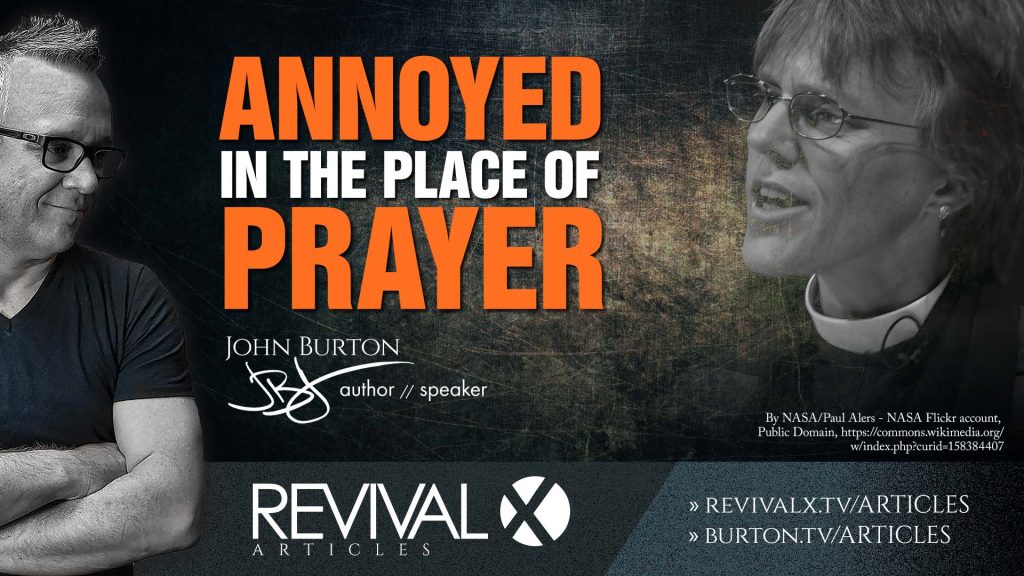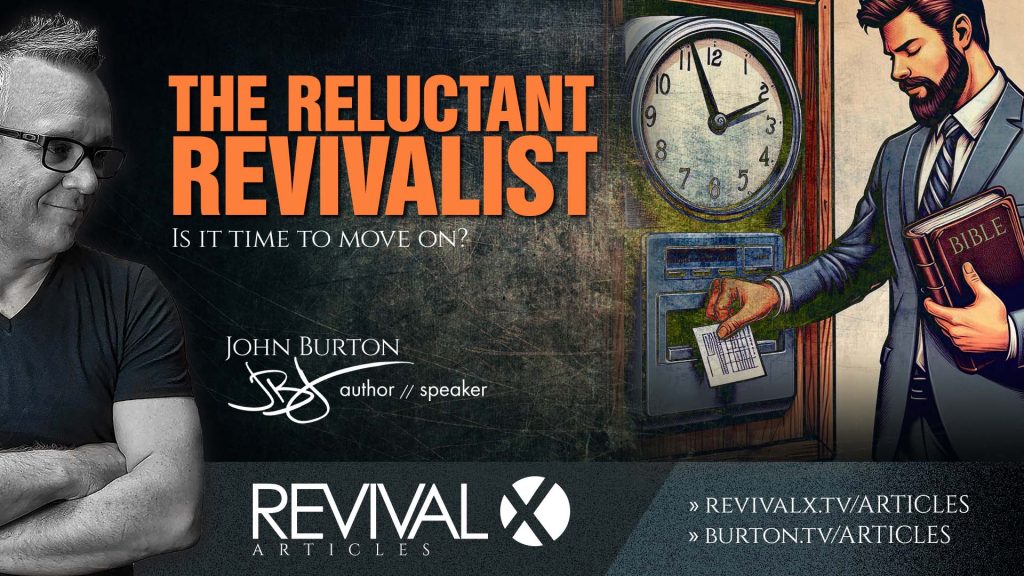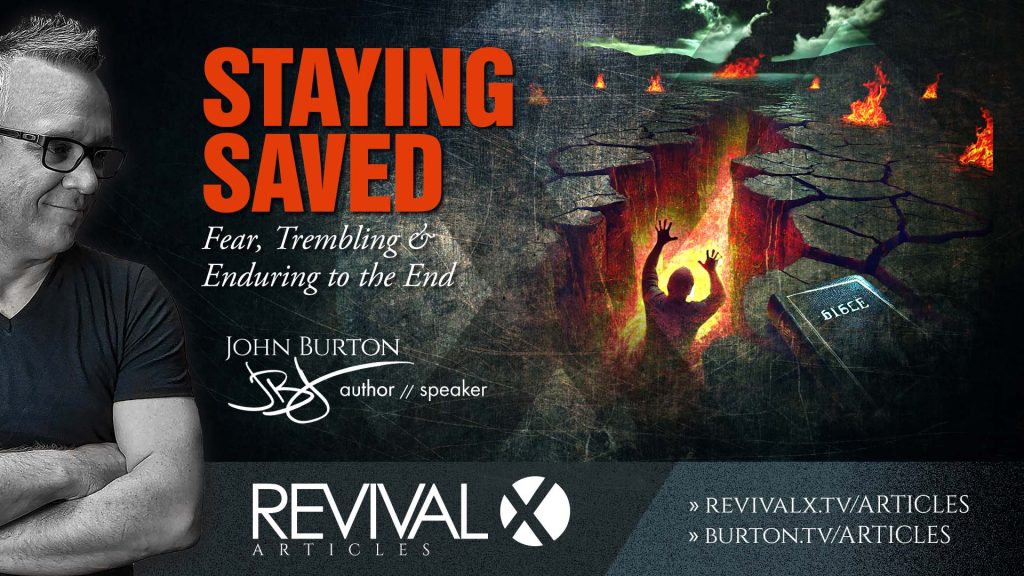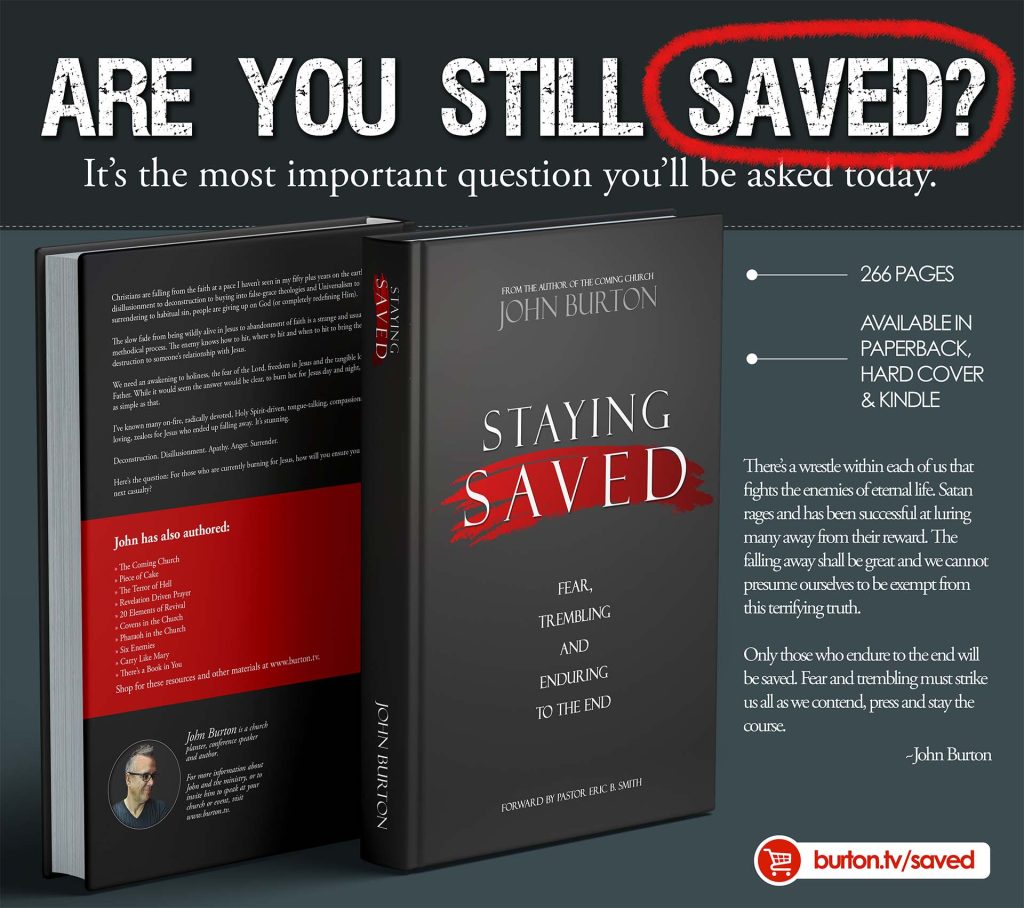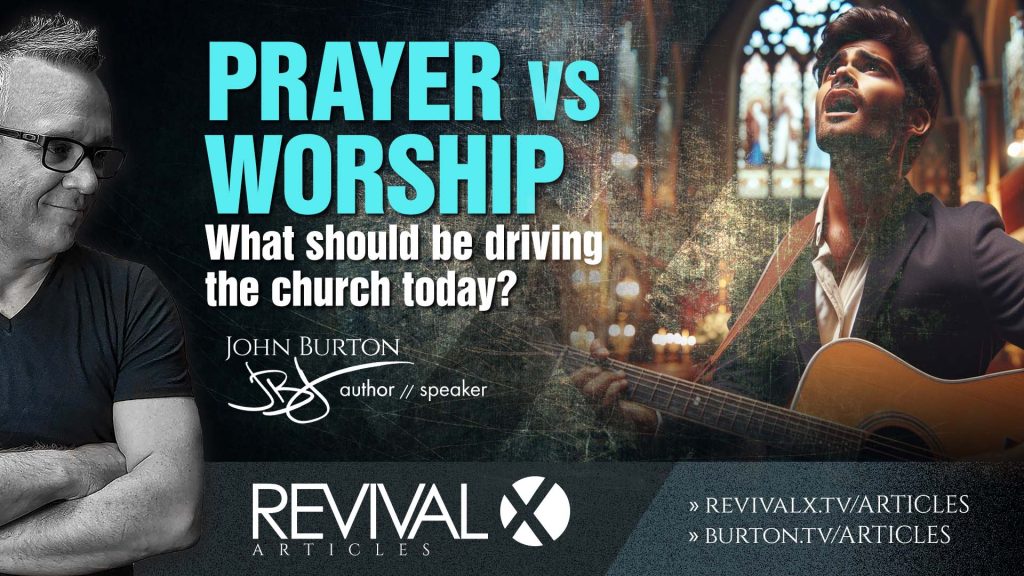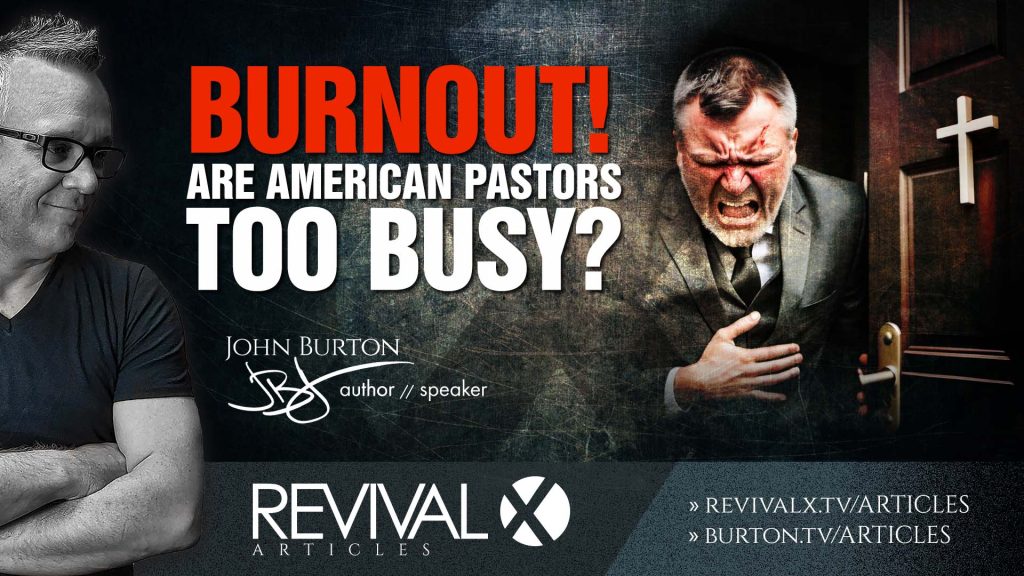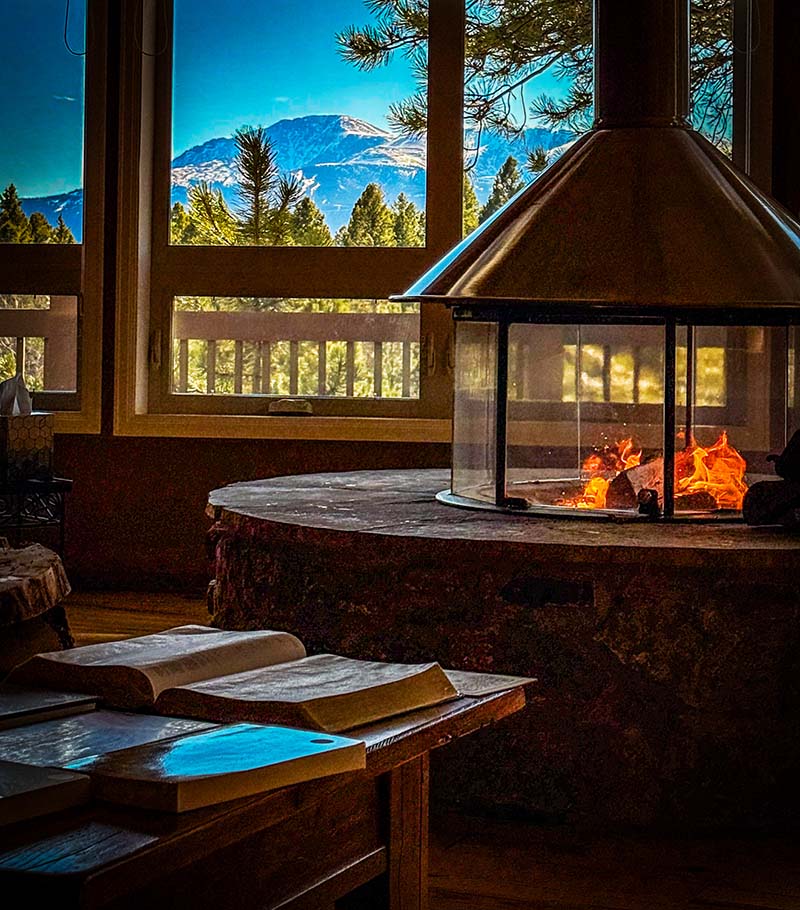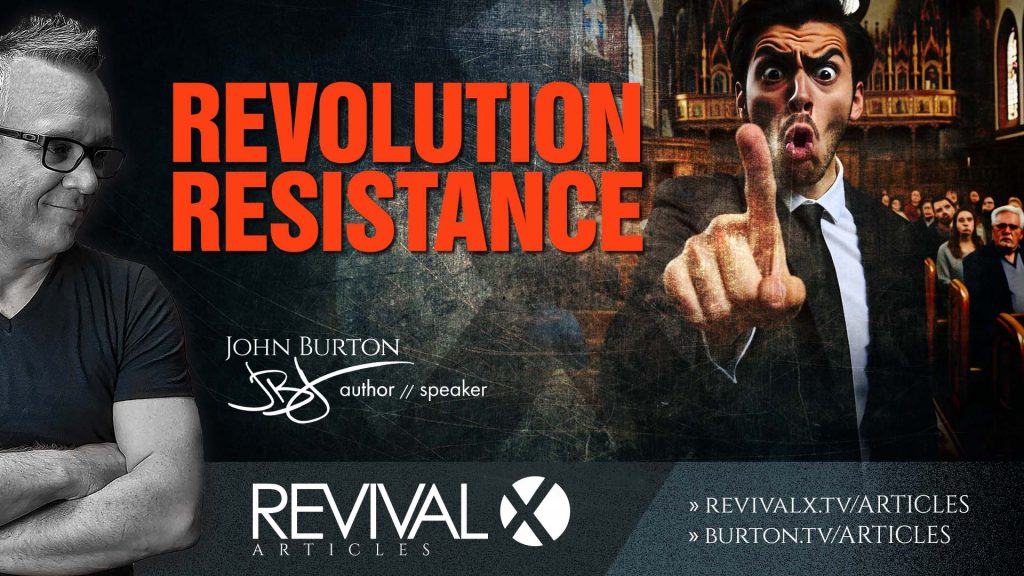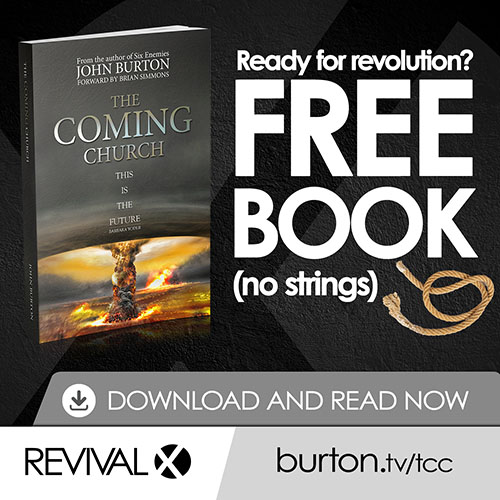Demonization Simplified
Can Christians be demonized?
Satan seeks to secure influence and control over our lives. This is clear to all. What many struggle with is the idea of demonization among Christians.
They often can't negotiate the idea that a Believer can be both demon possessed and a temple of the Holy Spirit.
In Scripture, we never see a difference between “possession” and “oppression.” In fact, those are man-made terms that aren't found in the Bible. The correct word is “demonized.”
While the following is admittedly oversimplified, it should help people grasp just how demonization works.
I'm going to substitute the influence of demons with the influence of people. This will help us understand how a third party can dramatically impact us, if we allow it. Of course, people don't demonize us and they aren't the enemy. The point of this exercise is to bring clarity on how outside sources affect us.
LEVELS OF DEMONIZATION: AN EXERCISE
1. GENERAL INFLUENCE: We are impacted by the world we live in. Immoral TV commercials, social media trends, popular culture and the flood of marketing we are hit by causes many to feel like they can't measure up. Rejection, low self-esteem and other negative emotional and mental results are common.
2. INVITED INFLUENCE: When we buy into the lies of culture, it's common to embrace them and alter who we are. The goal is to thrive and break out of our mediocrity, but most often we step right into the trap. We are conditioned to lose our identity in favor of another, all with our eager agreement. We open doors to the influence and affirm whatever is popular, no matter how immoral or inappropriate it may be.
3. MANIPULATION: The next level is much stronger as we find ourselves manipulated to be and do what others demand. This can include culture, but at this point it typically becomes more personal. Other people can put on the pressure to conform to their demands.
4. CONTROL: The chains of people's expectations get heavy at this level. In a very real-world example, it's possible to be in a controlling marriage that is devoid of love. The person being controlled feels angry and hopeless and struggles to find a way out.
5. IMPRISONMENT: Again, to take the example of marriage to this next level, terrible situations can get even worse very quickly. Understand, in a marriage there is a covenant, a union that brings complexities into the situation. Spouses are often terrified to escape this threatening situation and often stay in the prison without any attempt to find freedom.
6. TORMENT: The abuse, whether physical, emotional, psychological or other is all engulfing and overwhelming at this point. The hope of being free, joyful and experiencing abundant life is now gone.
7. HATRED: Every evil emotion now drives the person. Thoughts of death, revenge and much darker emotions take over.
8. DESTRUCTION: Full-blown defeat, destruction and open wounds of anguish now overtake the individual. They are broken, emotionally wrecked, mentally unstable and crushed. Suicide, self-harm, drugs and other attempts at relief are common.
9. DUPLICATION: While not an excuse, the next step for people in this scenario, whether it's the spouse or the children growing up in the environment, is often a life fueled by what they have experienced. Hatred, revenge, drugs, immorality, torment, control and more are passed on to the next generation. Fatherlessness, for example, has a direct impact on the children, and this model is duplicated in the next generation.
DEMONIZATION WORKS SIMILARLY
The above levels are in play in regard to demonic influence as well. To be demonized, at its most basic, is to come into agreement with the influence of the enemy.
If we agree, for example, that nudity in media is okay, we embrace the enemy's influence and we give license to it. Lust and sexual immorality often follow. Agreement is powerful, and Satan knows it. There are next levels that low-level agreement opens the door to.
In the above breakdown, it would be fair to say that demonization begins at number two. When we invite the influence, we align with the influencer.
It's also fair to say that demonization can come when we don't directly invite the enemy to join ranks with us. Torment, trauma and other devastating life issues can result in extreme weakness and hopelessness. If we don't fight back against the enemy's plans, it's common to fall into despair which opens the door for greater demonic influence.
The point of this exercise is to demystify demonization. It's extremely common among Christians. Our thoughts, our beliefs, our decisions and our reactions to culture and life can give the enemy access.
Demons are invisible entities that talk to us. Really, that's their most powerful weapon. When we listen and when we don't respond wearing the armor of God, demonic influence settles in. For many it can last a lifetime.
Of course, we have the victory if we do, in fact, wear our armor, pray with passion, stand on the Word of God and resist the enemy. We are more than conquerors!
No matter how dark and deep the demonization is, whether it's invited influence or fully manifested destruction, we can be delivered. For those influenced by generational curses or those who have passed on the curse to their children, it's time to fight!
Repent, surrender, cry out to God, seek deliverance, resist the enemy and change the future of you, your children and your grandchildren! The blood of Jesus is enough!
Annoyed in the Place of Prayer
It's not the words Bishop Mariann Budde spoke.
“In the name of our God, I ask you to have mercy upon the people in our country who are scared now.”
“I ask you to have mercy, Mr. President, on those in our communities whose children fear that their parents will be taken away.”
“May God grant us the strength and courage to honor the dignity of every human being…”
These are direct quotes from the message that Bishop Mariann Budde released to the nation at the inaugural prayer service. It's hard to argue with the words, which, I'm sure, were carefully poured over and selected. Mercy, strength, courage, honor, dignity. All good things.
THERE'S MORE THAN WORDS TO BE EVALUATED
While it's true that some campaigning Christians are creating unnecessary division with rants and accusations, there are others who are celebrating the Bishop's rallying cry as heroic and undeniably “Christian.” The divide within the church is wide.
Those who are leaning left predictably do not discern the spirit behind the words. I've watched many previous radicals for Jesus become disillusioned by the church. It's terribly grieving to see people who were champions for holiness fall for the religious deception of the day. Grieving, but not shocking.
What has shaken me is the number of authentic lovers of Jesus actually buying into what Bishop Budde is selling. I'm stunned. They are actually supporting her message.
More than any time in history, we need the gift of discerning of spirits in the church. Many false-teachers will arise with convincing words in their mouths. The Anti-Christ himself will be seductive, brilliant, charismatic and full of words that will appease many of the most spiritual among us.
GREATLY ANNOYED IN THE PLACE OF PRAYER
This message by Bishop Budde was filled with “true words” and delivered in the place of prayer. After reading the following passage of Scripture, you can't deny the irony.
“As we were going to the place of prayer, we were met by a slave girl who had a spirit of divination and brought her owners much gain by fortune-telling. She followed Paul and us, crying out, “These men are servants of the Most High God, who proclaim to you the way of salvation.” And this she kept doing for many days. Paul, having become greatly annoyed, turned and said to the spirit, “I command you in the name of Jesus Christ to come out of her.” And it came out that very hour.” (Acts 16:16–18, ESV)
The slave girl was driven by a spirit that benefited many. Lies weren't being spewed. In fact, the truth she shouted was clear and powerful. Then why was Paul greatly annoyed?
It wasn't the message that bothered him. It was the spirit. It was the agenda. It was the defiance.
Today's authentic, Spirit-filled Christian nation is annoyed at the wicked spirit that was catapulted into our country. The prayer service was desecrated and curses, intentional or not, were released.
The passage in Acts continues by revealing what happens when the Spirit of truth confronts, delivers and dares violate the agenda of the religious. Attacks. Beatings. Imprisonment.
Oh, and keep reading a little further and you'll see:
“About midnight Paul and Silas were praying and singing hymns to God, and the prisoners were listening to them, and suddenly there was a great earthquake, so that the foundations of the prison were shaken. And immediately all the doors were opened, and everyone’s bonds were unfastened.” (Acts 16:25–26, ESV)
FALSE LOVE
Many on the religious left are crying out with a message of supposed love, though their definition doesn't pass muster when compared with Scripture.
From my article, The Great Love Deception:
Keep in mind that false or tainted love doesn’t flow mostly from an evil, debased heart. It also doesn’t mean that there is nothing about the argument or viewpoint that is true. A person who craves pure love can, in their zeal or in their weakness, allow impurities into their expression of love that twists and compromises it. The reason I needed to say this is to encourage you if you’ve been hit by the false-love spirit. Your desire for manifested love is very probably true, yet the enemy can come in and confuse the process.
The inaugural prayer sermon feels like love, and many of the points can be accepted as true. However, the deconstructed and the liberals most often fail to understand what true, biblical love looks like.
It has to be said, without any nefarious motive or ill intent, that Bishop Budde endorses a heretical message and is a leader in a heretical movement, the Episcopal Church. She cannot be considered a sister in the Lord. This is enough to raise red flags regarding her sermon.
While I'm confident she has many impressive and honorable traits, that's not enough to pass the scriptural litmus test. Many of society's nicest, most honorable, kind and caring people are not believers in Jesus and his truths.
Yes, the unsaved can at times be kinder than the saved. That's a sad indictment on the church. That being said, it doesn't exonerate those who endorse and spread heresy. Their message is eternally deadly.
THE ANOINTING MATTERS
No Spirit-filled Christian would believe Bishop Budde's message carried the anointing of the Holy Spirit. It did not.
It was fueled by agenda, erroneous beliefs and human wisdom that was wrapped in the guise of love.
This doesn't mean we hate, despise, shame or seek her destruction. God loves her passionately, just as he loves those she referenced in her message.
It's time for the church to exhibit true love that cannot be counterfeited by those who do not know God. It won't always affirm, appease, tolerate or include, but it does reveal the burning passion of Jesus for mankind.
An Open Letter to Normal Christians
Delay is no longer an option.
The term normal Christians is in no way meant to be disparaging. It's defining.
For the sake of this letter, a normal Christian would be someone who faithfully connects in a church, develops life-giving relationships with other Believers, gives joyfully, loves to worship and has a desire to grow in their relationship with Jesus.
Further, they may be in the Spirit-filled camp or may align with any number of additional authentic, Christian expressions. These are people many would consider the spiritual backbone of society. Some may be candidates to serve as elders, Sunday School teachers, small group leaders and pastors. This healthy, vibrant church crowd has a significant measure of devotion, or at least wild curiosity.
However, such a devotion to their “Jesus experience” isn't enough. This is the purpose of this letter.
YOU WERE BORN FOR MORE THAN THIS
There's a difference between our personal journey and our ministry. Now is the time for ministry. Revival needs you.
We are on a rescue mission to save multitudes from the torments of Hell. When this is what drives us, it becomes quite clear, quite fast, that personal edification and satisfaction once or twice a week won't suffice.
The experience God has for all of us eclipses the “church as usual” paradigm that nearly every Christian is familiar with today. A massive, all-encompassing reformation, a radical revolution, is required.
Revival is not a meeting under a tent and it's not a pie-in-the-sky dream. Revival defined is simply biblical normalcy. When we are living a biblically normal life, the fireworks start exploding all around.
You weren't born to stop short at a church commitment, bedtime prayers and a nice, safe, Christian life. Simply, you weren't created to be normal.
THE SIN OF BEING AVERAGE
In this hour when normal, average Christianity will compromise the advance of revival and the salvation of millions, I must challenge you to radically, comprehensively reconsider your spiritual life. Everything must change.
Satisfaction with the present is fatal to the future. ~Glen Berteau
While the church you attend might not be ready to cater to the hungry, desperate remnant, you have no choice but to join the ranks of the radicals. Burn hot, contend in fervent intercession, discover your spiritual gifts, shift atmospheres and unite with a Gideon's army to route the enemy and call down fire from Heaven!
THE CALL OF ALL
Again, this letter is being written to normal Christians. It's time to awaken the Jesus freak within and live a life worthy of a bloody cross and an empty grave.
It's time to lay down the dream of finding a happy church experience where the baristas know your name. The call of all in this desperate and glorious hour is to die to self, take up our cross and burn with Holy Spirit fire. No longer can we be satisfied with lesser things. The deep is calling and we must respond.
If your church doesn't provide the opportunity to rage on fire like this, then, don't jump ship. Stay faithfully connected while you add to your weekly schedule prayer meetings, prophetic gatherings and city-focused missions. Find a tribe that will not stop until full-blown revival, reformation and revolution strikes your city.
GET COMFORTABLE BEING UNCOMFORTABLE
Ben Johnson, the new Head Coach of the Chicago Bears, announced to his team, without apology, that they must get comfortable being uncomfortable.
For too long the church has been about us. Our experience, our satisfaction, our enjoyment, our promotion, our ministry, our connection, our growth. A shocking shift that's coming to the church is a disruptive departure from the tired, powerless norms of the previous generations. The remnant must arise and the focus now becomes an outpouring of the Holy Spirit in the region.
The only way to see this come to pass is if we cancel the “sail away party” on the cruise ship and enlist on the battleship. You are a soldier not a tourist. You're on a mission, not on vacation.
No longer is the church to meet our demands and expectations. We are there to meet the demands of the mission. Blood, sweat and tears will flow as we pray continually, walk in the spirit, burn white hot and run toward a fulfilled assignment.
THE BLUEPRINT
The severity of the season demands all hands are on deck and ready for war.
Instead of Ted Talk-style encouraging nuggets of truth to help us get through the upcoming week, pulpits must erupt with prophetic revelation as anointed men and women of God equip the saints for battle. The goal isn't to alleviate stress. It's to become specialists, Navy Seals, Green Berets, people who have the skills, devotion and passion necessary to look wickedness in the face and blast the light of Jesus into dark, demonized territories.
This means we must gather frequently, pray strategically, grow in the prophetic, understand our authority and advance in our supernatural superpowers. This type of life starts on our own, in our prayer closets, but it can't end there. The corporate assault necessary against the kingdom of darkness requires a unified advance. This is why this letter is so critical. You can't be normal. You can't be average. You can't do it alone. You are needed in the war room and on the front lines.
So, all who are living a predictable, typical, normal, average, tired life that looks no different than the way most every other normal Christian is living, pray for shift.
A mighty shockwave will indeed impact you, shaking you off your feet and driving you to your knees. If God is to manifest today, we cannot remain the same. Today's church shows little blood, bruises, tears or desperation as a result of the cross they supposedly carry. Most don't even bear a single splinter.
You were called to be different.
The Reluctant Revivalist
The Bible Belt can give quite the spanking.
Twenty years ago I'd never thought I'd attach the word reluctant to my passion. Actually, it's my calling. I'm a revivalist. A reformer. The mandate is nothing short of revolution in the church and I've given my entire life of ministry, since the early 1990's, to this mission.
When we planted our first church in 2001 in Manitou Springs, Colorado, I was gloriously naive. The fire within to see a raging blaze overtake the region was so real to me that I was convinced that throngs of people would flood in the moment we opened our doors. “Yes, finally, a vision so extreme and a burning so overwhelming has come to our city!” That's what I believed most would be crying out in their heart. Revival was drawing near and, obviously (right?), every Spirit-born Believer in the city would jump to life. Wrong.
FEW CARE ABOUT REVIVAL
A good number of people are curious about the impact of revival.
Some will invest, but only to the extent that their pet theologies aren't threatened, their personal ambition is affirmed or their offense doesn't overtake their hearts. They will dig the wells of revival only until their self-imposed limits are reached.
Few are so captivated that they will lay down their lives and do the work necessary to see it come to pass. No limits, no demands. They walk daily with a cross on their backs and relentless passion in their hearts.
Contrary to what many believe, we aren't waiting for God to initiate an outpouring. Revival is biblical normalcy. That's the definition. Living in supernatural overflow is the default for Believers, or at least, it's supposed to be. God is waiting for us to respond to the cross, the resurrection and the Upper Room. The delay is on us.
I'm not trying to sound cynical. My faith is extreme and my passion for Jesus and what he wants to do in the cities of the earth is intense. However, after planting three churches in three markedly different regions, I've discovered the revival tribe necessary to see revival come is very small. Gideon's army small. Maybe one percent of the soldiers are willing and ready to go to battle. That means in a small town like Branson, Missouri, where we are based, there may be less than 100 people who would fit this description.
THE BIBLE BELT
I'm writing this to encourage other revivalists. I believe we need to go deeper into prayer and discover just what the hinderance is to the shift that is so necessary.
I'm also writing this to the rest of the Christian camp, pastors and leaders included. It's time to invite and embrace shocking and threatening reformation.
I'm currently leading my third church plant, Revival X, in Branson, Missouri. We are blessed beyond measure to live here and God has raised up some anointed and phenomenal pastors and others in the region who are hungry for a move of God. I'm also humbled and thankful for such a devoted team of fire-breathers at Revival X. They move my heart!
However, the shocking and threatening reformation has yet to visit this Bible Belt region. The laborers (intercessors, prophets, five-fold ministers and others) have yet to gather and engage.
The spiritual heritage of the Bible Belt is rich, but if we aren't careful, that heritage can cause the region to miss out on a mighty move of God.
“Sunday go to meeting,” “church as usual,” pastor-driven culture is a tradition that few are willing to break.
The new wine won't fit there. It can't.
The new wine skin required will radically violate much of what has become standard, so much so that many will consider it sacrilegious.
The further south you go, the more challenging it gets. We need to see this religious spirit defeated so the wildfire of the Spirit of God can establish the new.
WHAT IS NECESSARY?
Our simple mandate at Revival X is to gather our tribe of prophetic, revival-driven leaders, intercessors, students and others who are ready to pay a steep price for the greatest move of God in history. The cost is high but the return will transform the planet. Is it not worth it?
A ministry friend posted recently that the shift from pastor-led to apostolic-led churches is extremely hard. I'd say it's nearly impossible. It's also the mandate of this season.
This tradition of pastoral-heavy churches has overtaken the Western church, and much more so in the Bible Belt. Pastor-led churches are the default, to the detriment of the new wine that's waiting to rain down from Heaven. The thought of shifting from a culture that's primarily pastoral to one that's primarily prophetic and apostolic is too ridiculous for many of today's traditional Believers to consider. It's too threatening to the pastors who carefully guard their churches.
I believe there are many reasons for this resistance, but one stands out:
Pastor-driven churches give most of the attention to the people. The goal is a full house of happy family members. This is satisfying to the people.
Apostolic/prophetic-driven churches give most of the attention to the assignment. The goal is to gather and equip laborers who will advance the Kingdom of God. This is an unwelcome burden to many.
Simply, most people don't want to be trained for battle, they want to be nurtured and encouraged. Their focus is not on the advance of the church in the city or on the vision for revival. On a daily and weekly basis, the passion of most is internal versus external. They want to discover happiness, make friends and find relief from the stress of their lives.
The church, to many, is the medicine they need to lift burdens and get refreshed.
Nurturing, encouragement and burden-lifting are good endeavors, but not as a prime goal. It's the starting point. It's the preparation for the very reason the church exists–ushering in revival and advancing against the enemy. It's a warship not a cruise ship.
Once Revival X (or any church) finds their tribe, gathers 50 or 100 radicals who are fully trained in key disciplines and who are burning in the spirit of intercession, then the true ministry can begin. Until then, we are in delay.
WHY AM I A RELUCTANT REVIVALIST?
Many reasons.
As I've already expressed, the revival tribe is truly small. I sometimes wonder if I'd have more impact writing books and articles, traveling and speaking and putting out videos and podcasts than leading a team of radicals. I may no longer be the man for that job. I understand that the shift in the church, at our current pace, very well may take decades or longer.
I envision my book, “The Coming Church” laying undisturbed a hundred years from now as a relic on a used-bookstore bookshelf, ignored, forgotten, gathering dust–until a young, emerging new Billy Graham for the next generation picks it up.
Is it possible that the long-game strategy demands a shift in approach?
Additionally I'm growing in reluctance to current strategies for another reason–it's hard for me to watch my family struggle with the intensity of the warfare and the expected, yet impossible to prepare for, betrayal and other weighty pressures. It's not their fault, but it is their pain.
I'm authentically excited about additional ministry possibilities, especially those that flow from the heart of my amazing wife Amy and our children. If that emerges at Revival X, then great. If not, they have so much to offer and it may be time to shift focus on them in a very real way.
I, along with most apostolic people, am typically quite resilient to the severity of the pain and trouble that comes with a reformation ministry like ours. Yet, after nearly thirty years of apostolic, prophetic, revival ventures, I have to admit it might be time to seek God for wisdom on a differing approach. If the tribe is ready to run and the timeline of revival expedites, and if God demands I stay the course, I'm all in. The passion still burns.
However, if it's time, at age 55, to radically transition, I'm ready. I know God loves me and is making me ready for the next season, no matter what or where it is.
GIVING UP?
I don't care about optics. It doesn't matter if people may look at a shift as waving the white flag. I don't consider a possible shift to be due to some sort of failure to see the current assignment through (though, failure like this, in and of itself, is not as negative as some consider it to be). Regardless of the raised eyebrows of the people, I'm not giving up. I'm open to turning a corner, however. My belief is that obedience to God's shift will result in greater impact than I am currently having (should that shift come).
Yes, it's true that my giftings are unique. I don't lead with a pastoral edge. I'm looking for supernatural assignments, not potlucks and picnics.
I'm keenly focused and am not attempting to develop a typical “church family.” I'm gathering an elite force of spiritual fighters. I understand that this is off-putting to many.
I absolutely have weaknesses, as we all do, and I'm fully aware that my style of leadership, in this day, where things have changed radically over the last several years, may be insufficient.
Further, the route I've taken to gather a remnant is possibly the most difficult way of doing it. That was deliberate from the launch of Revival X. We are looking for the radicals, those who aren't afraid of a high bar and a demanding environment. Thick skin, deep love, a teachable spirit and an unoffendable heart are mandatory.
Responding to the call to see a new wine skin come to the church is a challenge that few are interested in. Though, those that do respond, whether it's here or at other similar revival ministries, come alive with a fire that transforms beyond measure.
I fully believe revival is coming to Branson, and I'm cheerleading other incredible local ministries as they advance toward it. I'm also fully invested in this current season at Revival X. If it explodes into the next phase, and my family is safe and my heart is ready, I'm ready to contend in blood, sweat and tears indefinitely.
MY FELLOW LEADERS
Burnout is hitting leaders at an unprecedented level today. The wounds of ministry are taking many pastors and leaders out. Do not be a casualty. God's love for you is much deeper than his passion for your ministry. Yes, staying planted when God reveals that's the right move is critical. Find people to hold your arms up. Gather the intercessors. Don't quit.
However, remain open to the possibility that a shift is coming.
Over time, I learned that both of our previous church plants, in Manitou Springs, Colorado and in Detroit, would be short-term assignments. We experienced supernatural, wild and mind-blowing miracles and wonders and moves of God that I've written about in books and articles. The legacy, along with the challenge and pain, in both places, was and is real.
The legacy didn't demand that we continue on forever. In both locations, a shift came. God worked miraculously by revealing what the shift was. He never left us hanging. He made it clear what was to be done and I'm in awe to this day.
It may be time for you to move on. Or it may be time to shift your current ministry. Or it may be time to take a sabbatical. It may also be appropriate to dig in and stay put. Allow the Holy Spirit to speak to you directly.
Of all of my church plants and ministry assignments, Branson has been, by far, the most difficult. This surprised me since, of course, I'm in the Bible Belt. This belt has spanked me. My personality has me fighting back with ferocity! I'm wired to scratch and claw and build and advance until my strength is gone. That sounds good, and often can be good, but is it possible my personality could also get in the way of a necessary transition. Yes, it's more than possible.
I'm stunned that the “God and country” celebrated Branson region has been the most difficult assignment of my life. What are we up against, God?
Manitou Springs was steeped with witchcraft and the occult, yet God moved in power for years.
Detroit was a different environment entirely, and the challenge was extreme and the move of God in our ministry and region was incredible.
But Detroit and Manitou Springs don't compare to the challenge of Branson. I'm still trying to wrap my head around it.
So, my question is simple: is it time to contend even harder, or is it time for a dramatic shift?
I'm praying. I'm excited. I'm tired. I'm invigorated. I'm questioning. I'm full of faith. My steps are ordered by the Lord. So are yours.
Remember, it's all about revival. Millions of souls will be rescued from an eternity in Hell if we get this right.
5 Ways Pastor-Led Churches Hinder Revival
Reformation of systems and structures must come if we hope to host revival.
Listen to the podcast:
I've spent years traveling to churches all over the nation and have been blessed to get to know some incredible pastors. They are hungry for revival and are willing to allow God to move any way necessary.
It's also true that many who hold the office of Pastor either unwittingly or intentionally disrupt the pursuit of revival in their city. They simply aren't gifted or wired to understand the demands of revival much less the strategy to launch and sustain it.
I strongly believe we must embrace a shift away from pastor-led churches as apostolic and prophetic leaders advance the city-church toward an outpouring. The systems and structures must change dramatically allowing those with the gift of shepherding to eliminate the burdens of senior leadership.
What follows is a general analysis of the status of the church. By no means do I presume every pastor fits into this mold, but the definition and design of this spiritual office has its limits. Every biblical office and gift does. This is why reorganization is necessary as the entirety of the five-fold ministry begins to function together.
5 Ways Pastor-Led Churches Hinder Revival
ONE: They promote comfort over crucifixion
Those with a strong, dominant pastoral gifting with a mercy gift to match are keenly focused on protecting the flock. They easily tap into the hearts of the people they care for and typically desire to remove any sense of danger or discomfort.
Pastors are absolutely brilliant when functioning as nurturing shepherds. They are at their best when imparting into people one-on-one or in small groups. However, as apostolic catalysts for revival, their weaknesses become clear.
Instead of unapologetically calling people to “come and die”, their rallying cry is often to “come and find life.” Of course, abundant life is a clear benefit for every Believer, and there are countless other truths that reveal the joy, peace, freedom and wonder of a life in Jesus. These truths must be preached.
The problem is that advance toward revival is one that requires all who sign up to surrender as martyrs. The cost is extreme and the discomfort intense. A “happy family” style church gathering just won't cut it.
TWO: They are resistant to change
Pastors know that most people find comfort in consistency. A volatile, ever-changing church culture disrupts the peace and predictability that attracts increasingly stressed-out people.
The counsel is to steer a church like a cruise ship, not a speed boat. No quick turns or abrupt jolts. Many pastors will take several years to work into significant changes. Unfortunately, revival can't wait that long.
True apostle and prophet-led churches may introduce major transitions several times a year. Week to week the focus can dramatically change.
It's common to move from unplanned seasons of deliverance to strategic intercession to mass repentance—all in the same month. The activity of the Holy Spirit, prophetic revelation, attacks of the enemy and other happenings demand quick reflexes.
THREE: They lack an apostolic viewpoint
There are many leaders who are hybrids. Pastor/apostle, pastor/teacher, etc. However, those who are solely pastoral often have a difficult time grasping the ministry of apostles and prophets. As a result, their church is usually devoid of these influences.
Further, their daily focus is not the city. It's their own local church. This may be one of the greatest hindrances to revival due to the regional nature of outpourings. People who are pursuing revival in their own local context don't understand that God's eyes are on the city. In Scripture the church is not defined by street corner. It's defined by the city or region.
Advance toward revival absolutely demands that we mostly focus on the area outside the walls of our church. This tends to be difficult for pastors as their hearts are more connected to the people close to them than the multitudes beyond their reach. Apostles tend to come at it from the opposite direction. They see over the horizon and have a passion to equip a few carefully selected firebrands for the mission.
FOUR: They avoid alienating people
Apostles and prophets are eager to take the Gideon approach, eliminating 99% of those who are unready or unwilling, and advance with the remnant, the one percent who are willing to respond with precision.
Such an approach terrifies many pastors. The thought of losing people causes them to lie awake at nights. When people leave their church, depression can set in. The fear of loss consumes them. Promoting a purging of the sheep makes no sense to most pastors. Even if it does, they fight it at all costs.
The truth is that millions of people are waiting for a refined, holy, surrendered church army to get into position. Apostles know the mission can't be fulfilled with the wrong people. Of course, Apostles who have the heart of God are not cruel during the purging, but they allow the people to choose if they are willing to pay the price or not. Pastors usually don't even give people the option. They want everyone happy, relaxed and unpressured.
FIVE: They lack regional authority
By design, pastor's focus and authority is on the micro level. They are not often equipped or authorized to administer the church of the city. As I said before, some are hybrids, but for those who are not, frustration will come fast when they try to lead a region.
Pastors should certainly be connecting with apostolic city leaders, strategically planning how to advance toward revival. Pastors play a significant role in the process as they train and nurture people and make them ready for battle.
It's critical for all pastors, all local churches and all home churches to be deeply invested in the revival strategy in the city. There must be clarity on their specific role, on what other city leaders to connect with each week and on the overall vision as communicated through key city prophets and apostles.
When governmental order is restored in the church of the city, local churches will have burdens lifted and new strength will come. Regional revival is the goal of every church and the only way to experience it is if we are rightly positioned.
Staying Saved: Fear, Trembling and Enduring to the End
Many previously authentic disciples of Jesus are now singing, “I once was found and now I'm lost.”
Christians are falling from the faith at a pace I haven’t seen in my fifty plus years on the earth. From disillusionment to deconstruction to surrendering to habitual sin, people are giving up on God (or completely redefining Him).
The slow fade from being wildly alive in Jesus to abandonment of faith is a strange and usually methodical process. The enemy knows how to hit, where to hit and when to hit to bring the most destruction to someone’s relationship with Jesus.
I’ve seen it time and again, and it’s tragic. Those who slip, slide or full-on fall away have had their lives infiltrated by wicked schemes of deadly, evil spirits. Imaginations weren’t taken captive and decisions are made from a wounded, disenchanted, disgusted heart.
The fear of the Lord isn’t there. The satisfaction of a life with Jesus eludes them. Joy, peace and victory are nowhere to be found. Supernatural Holy Spirit power is no longer experienced. Faith in the Word of God is gone. Woundedness and despair are intense.
The deconstruction pandemic that’s playing out in this end-time season must be responded to. We can’t allow the enemy to compromise the faith of people that God loves so deeply.
While it would seem the answer would be clear, to burn hot for Jesus day and night, it’s not as simple as that.
I’ve known many on-fire, radically devoted, Holy Spirit-driven, tongue-talking, compassionate, loving, zealots for Jesus who ended up falling away. It’s stunning.
Here’s the question: For those who are currently burning for Jesus, how will you ensure you aren’t the next casualty?
Unsaved Christians
Do we understand the threat of sin in the lives of Christians?
Our journey into a critical revelation of eternity begins here. The casual, presumptive disposition of so many has resulted in a severe threat to their salvation. In fact, the contagious nature of this mind-set puts millions of people at risk. These are people, mind you, who are either convinced or unconcerned about their salvation.
This truth (and it is most certainly truth) is so casually ignored, or so violently refuted, that, as Scripture so tragically reveals, Hell enlarges to hold all who are flooding into it.
There is a glorious salvation to be had, and the enemy has tainted powerful, life-giving theologies in an attempt to counterfeit them—and draw people away from the one true God. God’s passion is for people to be wildly in love with him, and that is what the enemy is afraid of. Instead of radical intimacy and passionate obedience, people are falling for a lesser false-doctrine that communicates God’s apparent affirmation of them and affection for them—and it is resulting in a faux closeness to him for millions of “Christians.”
Our salvation is glorious and it is also weighty. We can’t presume upon it or take it lightly. I suggest it’s possible that most people who are convinced of their position in Christ would actually be in Hell if they died today.
The concept of unsaved Christians seems contradictory. I understand that. A Christian is a follower of Jesus. I am suggesting that there are many followers of Jesus, many who name the name of Christ, who are living their lives following him in an unsaved condition.
A massive and increasing number of Christians have been lulled into a slumber regarding the reality of salvation. They have a reputation of being alive but are dead because of their sin. The common presumption is that if we pray, read our Bible, go to church, and identify ourselves as Christians, then we are automatically exempt from condemnation. The problem? Too many have misunderstood just what it means to be in Christ Jesus. Tragically, it’s true that countless professing Christians are actually living in a place of condemnation because they aren’t truly in Christ Jesus. We can’t just call ourselves Christians and presume that we are truly in Christ.
My life and ministry have been marked by a troubled spirit and an unrelenting passion for extreme surrender, zealous prayer and an unapologetic call for passion, repentance and holiness. I understand just how separated, intense and broken we must be to truly be counted among the saved—or, I at least have an understanding of the type of deception that is causing people to remain careless in their walk with Jesus. To be a true follower of Jesus requires more than many of today’s theologies are communicating, and that does indeed both anger and wreck me. Anything short of radical just can’t be promoted anymore!
Why is my spirit troubled? Because I am convinced that a shocking percentage of professing Christians are on their way to Hell. We must exhort one another into radical faith.
These are people who believe they are in Christ Jesus—but are not—and who are heading to a Judgment Day that will stun them.
Today the world is watching as millions of people are following Jesus with no cross on their backs, and this is the heretical deception that must be exposed. God will, in time, reveal the wheat and the tares.
I'd encourage you to dive deeper into this topic by reading my newest book, Staying Saved. The topic is so critical that I'm making the downloadable version free, with no strings attached.
Go to www.burton.tv/saved to download your copy today.
5 Reasons NOT to Leave a Church
People are leaving or changing churches at a record pace—when should we NOT leave a church?
Listen to the podcast:
Ghosting happens at churches every Sunday. Pastors are confused as to why someone has disappeared or why they started attending elsewhere. Process has been violated.
We should never leave a church unannounced.
We should never decide on our own to announce that we are leaving a church.
We should always allow for extended time to discuss the possibility of leaving a church—and openness to staying—with the leader.
Unity around the mission of the church is something Satan cannot risk. The moment people lock arms, take their positions and unify with the Great Commission in front of them, it’s over. He’s done.
An opposing spirit, a spirit of independence, is convincing Christians that it’s time to take control of their lives and forsake the call to gather as the Ekklesia. We must repent, and we must return to position and get ready to move as the alarm sounds.
While there are (rare) times to move from one church to another, I want to share five reasons NOT to leave.
ONE: WHEN YOU DON'T FIT IN
My children would never leave the Burton family if they struggled to fit in, if they were misunderstood or if they were having a bad season of life. My wife wouldn’t either, nor would I. If we see the church as a part of the service industry like McDonald’s or Wal-Mart, we will end up leaving if we don’t feel welcomed or served. However, God plants us in a covenant family, not a shopping center.
What most people really mean when they say, “I don’t fit in at this church,” is that they aren’t enjoying themselves. Possibly, they feel rejected. I find it disturbing when rejection causes people to leave a church when rejection is what propelled Jesus to die and launch the church. Remember, the church isn’t to be there for us as much as we are to be there for the church. The mission of the church is demanding and not always enjoyable and we must be in position ready to work. I guarantee anybody who approaches leadership and offers to serve in the nursery or by cleaning the church would absolutely fit in. Their serving heart makes a place for them.
TWO: WHEN IT'S EASIER FOR YOU TO CONNECT WITH GOD ELSEWHERE
I know this may be a shock, but the primary purpose of the church isn’t to make it easy for you to connect with God. If we understand this, a million arguments against staying at your church will instantly disappear. It’s our job, individually, to develop intimacy with Jesus. If we are dependent on a pastor, worship leader or others to nurture our relationship with Jesus, we’re in big trouble.
Take fire that you’ve cultivated in your own time into the corporate gathering and burn hot. Serve well. Get into position, lock arms, serve the vision and advance the mission.
THREE: THE LEADERS AREN'T DOING THINGS THE WAY I THINK THEY SHOULD
Many people believe leaders should make it easy for people to follow them. I disagree. Church leaders are mandated to lead people into some of the most challenging, risky and costly missions the world has ever known. People should actually make it easy for church leaders to lead them.
People made it hard for Moses to lead them into the Promised Land and they died. They made it easy for Joshua to do the same, and they dominated.
The demand of the people can be so strong sometimes that pastors and leaders forsake their mission. They end up pleasing the people instead of God.
We need to repent for putting inappropriate expectations on leadership.
(Of course, I'm talking about paradigm differences, not severe situations like abuse or other such violations.)
FOUR: WHEN ANOTHER CHURCH HAS BETTER PROGRAMS FOR YOU AND YOUR FAMILY
We should never choose a church based on what we can get out of it. We are actually assigned by God himself to serve and build it.
My definition of religion is: Man’s attempt to use God to get what he wants.
When we expect to gain from the church ahead of sacrifice, we are embracing the same spirit that killed Jesus. The spirit of religion wanted to use Jesus for personal gain.
While it's okay to desire your family to thrive spiritually, we put too much emphasis on the church's role. Remember, we are to serve as soldiers in the church, not use it to fulfill our own spiritual desires.
“When Christ calls a man, he bids him come and die.” ~ Dietrich Bonhoeffer
FIVE: WHEN GOD TELLS YOU TO
Have you ever played the God card?
As a leader I’ve heard many times, usually through the grapevine, that, “God told so and so to move to another church.”
Really? That’s odd. I was entrusted as their leader, which is a very serious position, and God just forgot to tell me about this? He left me out of the loop? Maybe Hebrews 13:17 isn’t what we think it is? The church I'm leading isn't important enough for people to honor the mission? They just left because, “God told them to?”
The point is this—most always, God wouldn’t just tell you to leave without your leader being involved in the process. In fact, can I just be blunt? It’s extremely disrespectful, presumptuous, rude and self-serving to abdicate your responsibility in your current church by leaving without honoring the authority in your life. Your pastor has every right to participate with you in your process.
Yes, God may have called you to move on, but there is extensive process required before you do so. An independent spirit would tell you that nobody but God has any say in the matter. That's simply not scriptural. There is too much at stake to drop balls by leaving inappropriately.
The mission is too great, and you are too important to lose to greener grass somewhere else in town.
1 Thessalonians 5:12-13 (ESV) 12 We ask you, brothers, to respect those who labor among you and are over you in the Lord and admonish you, 13 and to esteem them very highly in love because of their work. Be at peace among yourselves.
Prayer-Driven vs. Worship-Driven Churches: The Great Debate
What's on people's church shopping lists?
Listen to the podcast:
The validity of “church-shopping” is a discussion for another day. Suffice it to say, people do it, and they have their lists.
Powerful worship, excellent teaching, a powerful youth ministry and dynamic children's ministry are in the top ten, if not the top five of all-time desires in a church experience. After all, what else is needed? You have deep, overwhelming, supernaturally charged worship and excellence in teaching and family ministries. Based covered.
Oops. We forgot something. Don't fret, though. It's been forgotten for quite some time, especially in today's church.
Intercession. Tongues of fire. Contending in unified decrees, declarations, warfare and passionate eruptions of oracles from heaven. You know, prayer.
DO PASTOR'S EVEN CARE?
In my early years of ministry, I was never asked about my prayer life or intercession strategies when interviewing for open church staff positions.
Many pastors (thankfully, not all) are uncomfortable in the prayer room and will either eliminate it from the culture of the church or minimize it to something less threatening. At best you'll find a group of faithful warriors praying in a glorified janitor's closet down a dark hallway in the church prior to the service. The pastor doesn't typically lead the meeting, much less attend it or even promote it.
If worship is strong and teaching is effective and other ministries are growing, all is well. Sure, they may say prayers at times, but a firehouse of burning intercession is a foreign concept.
WHY WORSHIP IS ADORED AND PRAYER IS A STRUGGLE
ONE: It's all about the experience
If we aren't careful, worship can become more about us than about Jesus. As I'm writing this, I'm pumping my spirit with worship music. Like many, I absolutely love anointed music whether it's in my headphones or in the sanctuary. It's enjoyable. It's edifying. It's emotional.
Prayer, on the other hand, can often be difficult. The cost is greater and the energy necessary to push through can be extreme. Of course, there are different modes of prayer including soaking, meditation, petition and others. From my experience, the greatest impact both for the church and for the individual comes when there's a healthy dose of strategic, informed, prophetic intercession, decrees, declarations and warfare. The breaking power of such prayer is intense.
The tender connection with the Holy Spirit that we might get with musical worship often shifts to a raging internal fire that demands mountains be moved and darkness be invaded. Of course, we aren't choosing between worship and prayer. We need churches to be driven strategically by both with prayer as the foundation.
TWO: There's a lack of equipping in prayer
Worship is easy to understand. Surrender, love, adore and exalt as some beautiful and anointed music fills the room. I'm not saying it always easy to enter in, but the concept of worship is easy to grasp.
The purpose and function of strategic prayer? Not so much.
We need training in what I call Revelation Driven Prayer. How do we hear God's voice? How do we declare prophetically what he's saying? What do we see in Scripture? How should we not prayer? What are the roadblocks?
Exhausting, right? As a prayer freak, I'll admit that it can be a battle. Often it's a war. I've wasted a lot of time and energy in prayer over the years by not praying correctly. If prayer is to be foundational in our churches, equipping in prayer must be equally foundational.
THREE: There's no vision
The concept of “having a vision” isn't something many people think about. Often, people go to church largely based on their desires, not their God-given vision for advancing the Kingdom. Again, they want a satisfying experience with great worship and great ministry. There's nothing inherently wrong with that, though it's tragically limiting. There's so much more.
When prayer-driven churches gather, the focus isn't mostly on giving the people a nice Sunday experience. They have gathered with war in mind. The vision is too intense to be okay with anything less than conquest. Plundering Hell and contending for revival consume their thoughts. Such a vision demands prayer at a level few would ever sign up for.
FOUR: Prayer can be deflating
Regular people don't want to be part of a church that struggles to punch through into the miraculous. Remnant Believers do, however.
A vision of intercession has built into it a resolve to keep pressing, keep prophesying, keep standing in faith until the breakthrough comes. If quick growth, instant wonders and visible impact are required to stay faithful in the place of prayer, most will quit. This is why churches often have to keep the hype going. We need the dopamine hits and the adrenaline rush every Sunday.
FIVE: Tongues are rare
Groans of intercession are required if we want to pray, walk and live in the supernatural. This type of corporate expression is rare as pastors accurately predict that many would run for the exits should it explode in the church.
The Holy Spirit must be invited to rage in our gatherings again! Baptisms in power must be non-stop as people become infused with an other-worldly language of intercession!
PRAYER-DRIVEN CHURCHES ARISE
I've campaigned for churches to eliminate all ministry for at least six months – except for prayer. Bring the worship team down from the platform. Call the youth and children into the auditorium. Shut down everything except for fiery, prophetic prayer in every service and see what happens.
When we return prayer to first place in the church, everything else will start to calibrate with God's design and the power of the Holy Spirit will again manifest.
BURNOUT! Are American pastors too busy?
According to Barna, one third of pastors are considering quitting.
One in five have considered self-harm or suicide within the past year.
Listen to the podcast:
I'm writing this from the SonScape Retreat Center in beautiful Divide, Colorado. The solitude, rest and fun that my wife and I are having along with other ministry couples and the incredible ministry staff is good therapy indeed.
Hard driving, production minded, spiritual leaders often admit they are burning out, losing the passion and considering stepping out of ministry while, at the same time, refusing to stop, breathe and refresh. The idea of a sabbatical never even enters their minds, or, if it does, they are convinced their board would never grant such a request. The only option is to keep working until the fire eventually goes out and families are left emotionally destroyed.
Last night, a former pastor shared a story with me of his desperate need for a short, six-week sabbatical a few years back. Many in his church aggressively campaigned against it, presuming he wasn't worthy of such an extended “vacation.” It went to a vote and his request barely passed. Upon returning, the tide had turned against him in even greater measure, and he resigned on the spot. Forty years of pastoral ministry was over.
We must understand that pastors are often depressed, have high blood pressure, are constantly attacked, poorly supported, in counseling, on medication, suicidal and desperate to quit. Further, pastor's wives are often ripped to shreds by destroyed friendships, gossip against their husbands, manipulative parishioners and nonstop unrest. It quite literally is a pandemic.
Even after three decades of ministry and reaching 55 years of age, I know I have so much to learn. In fact, after a week at SonScape, I'm invigorated, not discouraged, by my past blind spots. The fresh perspectives and input by the leadership team is making me excited about healthy shifts to life and ministry.
The point? Pastors especially need to continually re-sign up, get healed and allow themselves to come alive with what the next season holds.
Barna reports:
Henri Nouwen famously characterized the role of a pastor as being a “wounded healer.” This perspective underscores the importance of congregants, church staff and others actively supporting their spiritual leaders. Such care acknowledges that a pastor’s resilience and well-being are fundamental not only to their personal lives but also to the health of the communities they serve.
We must rest and play.
Sabbath means rest. It also means celebration.
The New Covenant Christian should be living a Sabbath life, playing, celebrating, rejuvenating, and ensuring they are not burning out, fading and emotionally dying. This isn't a Sunday plan of action. It's every day.
Sadly, the families of pastors and ministry leaders are often strained due to the unnecessary and unrealistic demands of the church. Vacations, recreation, turning off the phone and retreating to recharge are fiercely frowned upon by many. Pastors, after all, must be fully available, dead to their own desires and crucified by the demands of the people, right? It's dysfunctional.
When we launched our current ministry, I made it clear that I'd be burning hot and working hard to fulfill the vision God has given me. I also clearly communicated that I would not apologize for tending to my own heart and to my family. Ministry is a major focus, but not the only focus. It's also not the primary focus. I know, that sounds sacrilegious to some.
I let my leadership team know they would have room to grow into key roles in the ministry. When we move out of the way and encourage them to advance in ministry, it's quite powerful. Additionally, I said my family and I would be involved in other ventures on a regular basis. Vacations. Retreats. Recreation. Fun. Rest. Other ministry. Personal growth. The baton of leadership would often be placed in their hands.
Our current trip to Colorado will last three weeks. We've been away from the church several additional weeks this year as well. Additional time away is coming next year. If the church is dependent on me being front and center at every service, my leadership is failing.
I won't apologize for the priorities, and I believe pastors will be well served to adopt the same demeanor.
Schedule rest and fun on your calendar.
Block out significant time every year to disengage fully from the church. No ministry phone calls, no church work and no pastoral responsibilities. Play with your kids, date your spouse and relax.
Do not apologize to anyone. It's time to confront the ridiculous burnout culture in the church.
Preventative maintenance is necessary
The threat of depression, fatigue, disillusionment, health issues, emotional crashes, relational crisis and more severe consequences like heart attacks and marital affairs demand our immediate attention.
If we delete the noise on a regular basis, become unreachable at times, delegate authority and responsibilities and tend to our hearts, the crisis moments will begin to diminish.
I strongly recommend scheduling retreats like the one my wife and I are currently enjoying as often as you can. Our lives have been dramatically impacted here.
Focus on the Family and many other reputable organizations provide preventative maintenance opportunities that focus on everything from your marriage to your emotional health, and so much more.
Classes, workshops, retreats and other helps will strengthen your heart, your family and your ministry.
Churches, invest the money in your pastor.
The church should be budgeting a significant amount of money for self-care. Pastors don't need the added burden of attempting to finance strategies to support their emotional health. Church boards, pay up.
Pay for a month of fun and rest every year for the pastor and his family.
Pay for retreats and workshops several times a year.
Pay for training for other ministry leaders so they can be ready to lead when the pastor is tending to his heart.
Create a culture of spiritual, emotional and physical health in the church. This will not only strengthen the pastor, but everyone that attends will experience the benefits and, hopefully, tend to their own hearts in a similar manner.
We need more pastors and leaders, not less. This burnout crisis must be dealt with and the hearts of pastors and their families must be tended to.
Revolution Resistance – Is the Cost of Revival too High?
People are excited about dramatic change in the church, until they aren't.
Listen to the podcast:
Never has the expression of Christianity needed transformation more than now. I suppose one could argue the nailing of the 95 Theses by Martin Luther compares, but we are in the last of the last days. Shift must happen immediately.
People can get amped up about a shiny, new model of ministry that emphasizes what their spirits are crying out for. Reformation and an intense resolve to advance the Kingdom of God sound good. It feels good.
The current expression of the American church has become so ingrained in us that we presume it's orthodox. It's the default blueprint that can be improved upon, but not violated.
I propose it's time for violation. Tear it down and build it back up according to the paradigm God reveals.
The Struggle
Different ministries with visions unique to their location, the five-fold office(s) of leadership and the directives of God will determine the schematic of the church experience.
The City Church Paradigm
The revolution will result in different churches, within scriptural boundaries, functioning differently. Apostle-led churches will look very different than teacher-led churches. However, the various expressions of the church on the local level will be incomplete until they all come together on the city level. Kingdom-minded local churches will strategically unite, eliminate redundancies, share a common city-vision and encourage the people to connect in multiple locations.
This sounds smart, until pastors become threatened with losing “their people.” When tithes and laborers start heading down the street to another local church, support for this refreshed and strengthened church structure diminishes.
This is a much bigger topic than can be addressed here, but suffice it to say, there is a healthy method to facilitating the city church model. Flaky commitments and church hopping can't work. Sadly, even a healthy approach is too risky for many.
Intense Holy Spirit Activity
Yes, there are a handful of churches that do not temper the wildfire of the Holy Spirit. However, when the Spirit of God truly moves, the experience includes both discomfort and comfort, risk and reward, crushing and healing, surrender and freedom.
When this type of atmosphere is promoted amongst casual Christians who are not familiar with such supernatural activity, the resistance comes in full force. Visitors run away. Members complain. Half-committed people head for the door.
A Culture of Intercession

Possibly the most important and disruptive transition is a return to strategic prayer. Sunday mornings must be dominated by tongues of fire, groans of intercession and bold prophetic decrees. I'm not talking about hiding this in a lonely prayer room before the service begins. Prayer will be front and center in the sanctuary and will dominate the clock.
Pastors know the people will flee in terror should they implement such a thing, so, it doesn't happen. The revolution resistance is strongest when it comes to leading the people into the realm of the Holy Spirit via vein-popping, tear-inducing, fire-breathing intercession.
Sadly, many pastors know nothing of such a supernatural lifestyle and would be lost themselves in a culture of prayer.
No wonder Leonard Ravenhill said: Pastors who don’t pray two hours a day aren’t worth a dime a dozen!
Reduction of Pastor-Led Churches
I'd encourage you to read my article on this topic, The Coming Shift Away From Senior Pastoral Leadership.
Here's a portion:
The coming church will look so different than the church of today that we will find ourselves speechless. Everything man-made is going. Everything that God deems good but outdated is going. The coming church will be defined by fire and it will repel the lukewarm and religious—as it draws in the hungry and desperate.
Corporate leadership will shift from pastors to apostles and prophets primarily. Instead of merely relaying information, messages will be mostly challenging and directive with a clear expected response as the body is rallied to fulfill a corporate mission together. They will lead with the expectation that the entire unit will be moving in step with them as they fulfill the vision of the church in unity.
In the coming church, pastors will mostly be relieved of primary church leadership responsibilities and will be released to spend most of their time one-on-one with people and in small groups.
Of course, you can predict the resistance to this mega-shift in the church.
The burdens that will be lifted from their shoulders will cause them to wonder why they ever resisted at all.
There's More
Space doesn't allow me to address the many additional changes that are coming.
I cover a lot of it in my book The Coming Church. I'm making it available to you for FREE. No strings attached.
Download the book now at HERE.

